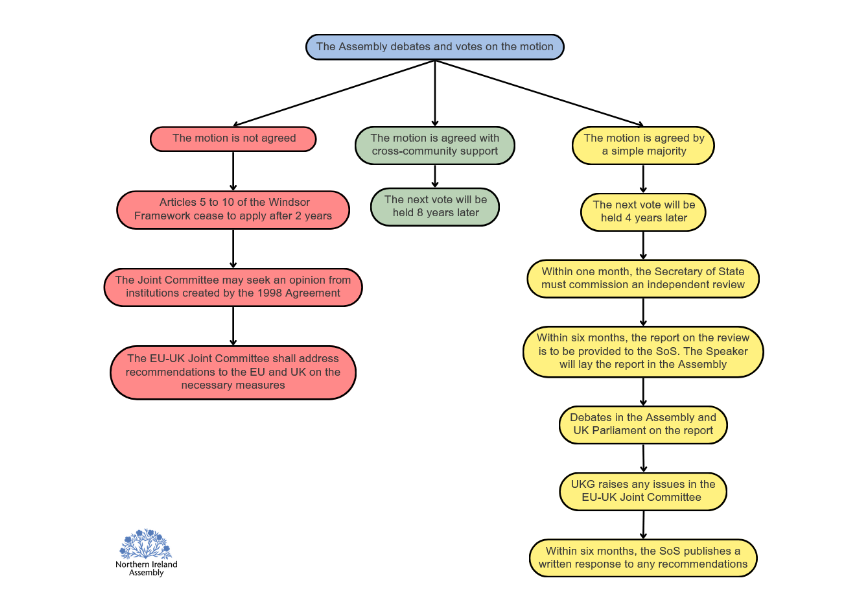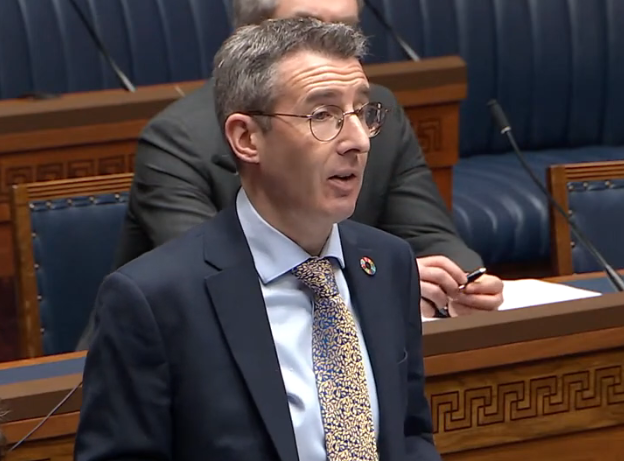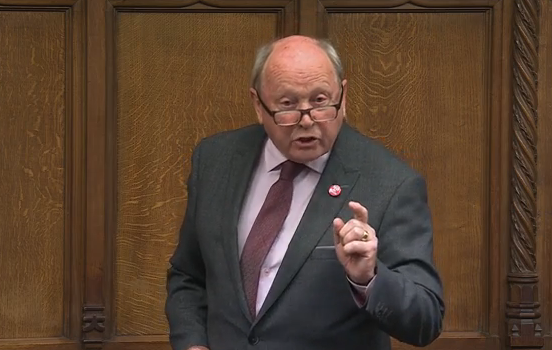Brexit & Beyond newsletter
9 December 2024
 Welcome to the 9 December 2024 Brexit & Beyond newsletter
Welcome to the 9 December 2024 Brexit & Beyond newsletter
Last week, a motion for a consent resolution was tabled by a number of Members. The Business Committee confirmed arrangements for the Democratic Consent Resolution on Tuesday 10 December (tomorrow).
The Second Stage of the Agriculture Bill took place on Tuesday 3 December when the Assembly debated its general principles.
On Thursday, the Committee for Agriculture, Environment and Rural Affairs received a Departmental oral briefing on the UK Emissions Trading Scheme Common Framework.
At Westminster, the House of Commons had the Second Reading of the European Union (Withdrawal Arrangements) Bill, the Private Members' Bill of Jim Allister MP.
- Democratic Consent Mechanism
- Agriculture Bill: Second Stage
- UK Emissions Trading Scheme Common Framework
- Windsor Framework Democratic Scrutiny Committee
- European Union (Withdrawal Arrangements) Bill
- General Product Safety Rules
- EU-Mercosur Trade Deal
- Other news
Democratic Consent Mechanism
Last Monday, the Speaker reminded Assembly Members that he had written to them on 31 October 2024 to draw their attention to notification from the Secretary of State of the start of the democratic consent process under the Windsor framework. He confirmed that the First Minister and deputy First Minister did not table a motion under this mechanism in November. He informed the House that on 1 December, notice of a motion for a consent resolution was tabled by a number of private Members.
In Plenary on Tuesday, Timothy Gaston MLA made a point of order to inform the House that he had written to the Attorney General to raise a query about the legality of the democratic consent vote.
Separately, an application for leave to apply to the High Court for Judicial Review of the democratic consent process will be heard this afternoon.
As previously reported, the Secretary of State issued explanatory materials for Members on Tuesday. These were distributed to all Members of the Assembly. The Business Committee confirmed arrangements for the Democratic Consent Resolution on Tuesday 10 December (tomorrow).
The flowchart below sets out the possible outcomes of the vote.

If you experience any issues with the flowchart, you can read this text version.
More information about the democratic consent mechanism is available on the Assembly’s website.
Agriculture Bill: Second Stage
Second Stage of the Agriculture Bill took place on Tuesday 3 December when the Assembly debated its general principles. The Minister for Agriculture, Environment and Rural Affairs told Members that the Bill makes provision “for changes to two legacy EU support schemes, namely the fruit and vegetable aid scheme (FVAS) and the agri-food information and promotion scheme.” He explained that “if they are to reflect post-EU policy development, new powers will be needed.”
The Minister informed the House that without the Bill, his Department “will have an ongoing legal obligation to fund eligible claims under the existing legacy FVAS [fruit and vegetable aid scheme].” The Minister said the Bill will “make support under the FVAS discretionary so that Executive Ministers have the scope to fully decide on funding priorities and ensure that support is available where it provides best value for money and best meets local needs.” He continued to tell the Members that the Bill will “provide the power to amend the assimilated law governing the FVAS.”

The Minister told the House that under the legislation “not-for-profit organisations could apply for EU support for promotional campaigns, primarily in third countries… the Bill includes powers so that any future promotion schemes delivered under the legislation could be tailored to best meet local need, subject again to the review of the legacy scheme and future policy development on support for food promotion.”
The Chairperson of the Committee for Agriculture, Environment and Rural Affairs said “The Committee is supportive of the principles of the Bill regarding support being prioritised where it best provides value for money and best meets local need. The Committee looks forward to considering the Bill in further detail during Committee Stage, and, as I have said, will be particularly mindful of considering any unintended consequences through a detailed scrutiny process.”
Michelle McIlveen MLA (DUP) said that “The transition to a discretionary model, as proposed in the Bill, offers an opportunity for innovation and tailored support to address the specific needs of the fruit and vegetables sector. It is essential, however, that the new model is not seen purely as a means to cut costs or reduce funding for critical sectors.”
Second Stage was agreed and the Bill was referred to the Committee for Agriculture, Environment and Rural Affairs for the next stage of scrutiny.
UK Emissions Trading Scheme Common Framework
On Thursday, the Committee for Agriculture, Environment and Rural Affairs received a Departmental oral briefing on the UK Emissions Trading Scheme Common Framework. The UK Emissions Trading Scheme (UK ETS) came into operation on 1 January 2021 following the UK’s exit from the EU. Under the terms of the Windsor Framework, Northern Ireland electricity generators remain within the EU’s Emissions Trading Scheme.
The UK ETS Authority published the provisional Common Framework in February 2023. It is comprised of the UK ETS Concordat and Framework Outline Agreement (FOA) which together state the agreed governance arrangements and cooperative decision-making processes in relation to the UK ETS).
The officials told the Committee the other UK legislatures are at differing stages in their scrutiny of the Framework. Scrutiny has been completed by the Scottish Parliament. It is content to proceed but will monitor the operation of the Framework in practice. The House of Lords has completed its scrutiny following examination by the Common Frameworks Scrutiny Committee.
The Climate Change, Environment and Infrastructure Committee of the Welsh Senedd does not intend to undertake scrutiny of the Common Framework at this time. However, officials advised it may revisit this position before the end of the current Senedd term.
Windsor Framework Democratic Scrutiny Committee
On Thursday, the Windsor Framework Democratic Scrutiny Committee took Departmental Oral Evidence on two EU Acts: Directive (EU) 2024/2853 on liability for defective products and Regulation (EU) 2024/2865 amending Regulation (EC) No 1272/2008 on classification, labelling and packaging of substances and mixtures.
Directive (EU) 2024/2853 on liability for defective products will come into force within the EU on 9 December 2026. The Committee heard the aim of this Directive is to strengthen consumer protection. It updates the liability regime for defective products. This update is to reflect technological advances in artificial intelligence, new circular economy business models, and new global supply chains.
Regulation (EU) 2024/2865 amending Regulation (EC) No 1272/2008 on classification, labelling and packaging of substances and mixtures contains rules on the classification, labelling and packaging of chemical substances and mixtures placed on the EU market. It also contains rules on the notification of information on substances and mixtures.
The Committee will publish its inquiry reports for both of these Regulations by 20 December 2024.
European Union (Withdrawal Arrangements) Bill
On Friday, the House of Commons had the Second Reading of the European Union (Withdrawal Arrangements) Bill, the Private Members' Bill of Jim Allister MP (TUV). He said that “The primary purpose of this Bill is … to restore equilibrium to Northern Ireland’s place within the United Kingdom and to our relationship as a nation with the EU.”

Jim Shannon MP (DUP) said “Our constituents must not lose their place in the United Kingdom of Great Britain and Northern Ireland without consent, by stealth, but that is what is happening. Brexit was a vote for all of us to leave Europe, not for Northern Ireland to leave the UK, and this outstanding matter is detrimental to our economy, peace and stability.”
Jim Allister informed the House that “It is very difficult for anyone trying to do business in Northern Ireland. In the main, small and medium-sized businesses do not have the resources to employ the extra 10 staff that a big business might to meet the requirements of crossing the Irish sea border. Small suppliers do not have the necessary resources, so they simply stop supplying Northern Ireland. That feeds the continuing diversion of trade.”
Regarding the purpose of the Bill, Sir Iain Duncan Smith MP (Conservative) said it is “simply to provide a solution for what is currently an unworkable position. I say to Government Members that it is not about 27 nations hating the UK; ultimately, it is about function.”
Clare Hanna MP (SDLP) told the House “Brexit was entirely a project about trade friction, and it has created friction for many people. Those people, including small businesses and the people I represent, absolutely want to address those issues. They want to streamline processes and to use the framework provided to solve problems. They do not want to tear down the edifice of the solutions, as the Bill would do.”
Deirdre Costigan MP (Labour) said “The Bill is an attempt to undermine the very foundations and underpinnings of the Good Friday agreement. It risks creating far more issues than it claims to solve.” Of the Bill, she said “At the heart of it lies a blatant disregard for the United Kingdom’s obligations under international law. Clause 3 shows that the legislation seeks to disapply key elements of the Windsor framework… The Windsor framework was the result of years of painstaking negotiation designed to balance Northern Ireland’s unique position post Brexit. For the UK unilaterally to disregard its provisions would be not only a breach of trust with our European partners but a dangerous precedent that could have profound consequences for our future trade agreements and alliances.”
The debate was adjourned and will resume on Friday 11 July 2025.
General Product Safety Rules
The EU General Product Safety Regulation applies in Northern Ireland from 13 December. GPSR requires that certain consumer products placed on the Northern Ireland market are safe and establishes specific obligations for businesses to ensure that safety. The UK government has issued guidance for businesses placing products on the market in Northern Ireland.
Commenting on the new Regulation, Tina McKenzie, Policy Chair at the Federation of Small Businesses, said “The EU’s upcoming General Product Safety Regulation will be a real barrier to international trade for some of our small firms looking to export to EU member states, but also move goods to Northern Ireland…… While the UK Government’s newly published guidance on the new EU rule is helpful, small firms are still faced with the complexity and associated costs around it. Governments from both sides should look at removing unnecessary trade barriers, not least those arising from the product safety rules, for small businesses in the UK-EU Trade and Cooperative Agreement review in 2026.”
EU-Mercosur Trade Deal
On Friday, more than twenty years after negotiations began, the EU and the Mercosur countries – Argentina, Brazil, Paraguay and Uruguay - reached a free trade agreement. The European Commission President Ursula von der Leyen announced the conclusion of the agreement at summit in Uruguay. The EU-Mercosur deal aims to create one of the largest free trade zones in the world, covering over 700 million people and nearly 25% of global GDP. It is still to be sealed by EU member states.
President von der Leyen said it would have a positive impact on around 60,000 companies that export to the Mercosur region. She said they will “benefit from reduced tariffs, simpler customs procedures and preferential access to some critical raw materials. This will create huge business opportunities.”
Other news
- Grace Gausden, writing for the I paper, reports that some small British businesses have stopped selling their products to the EU and Northern Ireland as a result of the new “complex” EU’s General Product Safety Regulation (GPSR).
- In an interview with ITV News, Miguel Berger, the German Ambassador to the UK, says an agreement which gives young people from the EU the right to live, work or study in the UK will be a “key objective” in negotiations aimed at improving UK-EU relations.
- Speaking to Euronews, President Milatović said that Montenegro aims to become the 28th EU member state by 2028.
- Joël Reland, Senior Researcher, UK in a Changing Europe argues that that “under the new Labour government a shift from divergence to alignment with the EU is in fact taking place.”
- Today the Chancellor is in Brussels to attend the Eurogroup meeting of EU finance ministers. She will reportedly tell them that closer relations between the UK and the EU will boost economic growth.
- Tomorrow, The Chancellor of the Duchy of Lancaster, Pat McFadden MP will give oral evidence to the House of Commons Public Administration and Constitutional Affairs Committee on the work of the Cabinet Office.
- Nick Thomas-Symonds MP, Minister for the Cabinet Office and Stephen Doughty MP, Minister of State for Europe, North America and Overseas Territories will give oral evidence to the House of Lords European Affairs Committee.
- The House of Lords will continue its scrutiny of the Product Regulation and Metrology Bill on Wednesday 11 December when further amendments will be discussed.



